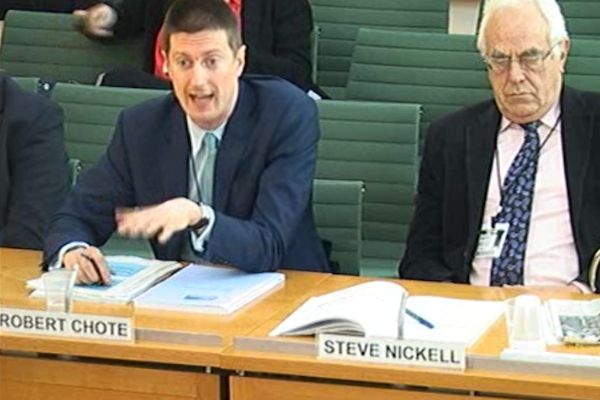‘We’ve done quite a good job at demonstrating the limitations of economic forecasting,’ half-joked Office for Budget Responsibility Chairman Robert Chote at the start of his Treasury Select Committee appearance this morning. And he spent a lot of his answers emphasising those limitations, while robustly defending himself against charges that the OBR is just making it up. His challenge was to explain to sceptical MPs why we should pay attention to the OBR’s new forecasts, given that their previous ones have missed by so much.
For the OBR’s economic forecasts — rather than its forecasts for the public finances — Chote admitted that ‘we don’t have access to any information that other forecasters don’t.’ There’s no magic trick that makes their growth forecasts any more reliable than anyone else’s. ‘So why not use the average of independent forecasts?’, asked committee chair Andrew Tyrie. The reason is simply that the OBR needs not just the headline forecasts, but the various specific forecasts for different aspects of the economy. So if all you’re interested in is how much the UK economy grows by in 2013, you’re probably better off taking the average of all independent forecasts, rather than placing any particular weight on the OBR’s.
But what about the fiscal forecasts — and particularly the crucial forecast for the structural current budget deficit that shows George Osborne meeting his fiscal mandate (just)? With some friendly questions, Tory MP David Ruffley gave Chote the opportunity to defend himself against criticisms that the OBR had ‘conveniently’ changed its methodology to help Osborne. And Labour MP George Mudie did so again, albeit with somewhat less friendly questions (‘I think you were more respectable when you were a journalist,’ he told Chote).
Chote wasn’t having any of it, pointing out that the forecast had been affected by two methodological changes: one which makes it slightly easier for Osborne to meet his target, and another which makes it harder. As the effect of the second outweighs the first, the overall effect was to make it less likely that Osborne sticks to his fiscal mandate than if the OBR had stuck to its old methodology. The claims of politically-motivated fiddling were ‘just wrong’, he said: ‘that criticism doesn’t stack up at all.’ And finally Mudie exhausted Chote’s patience. ‘As I’ve explained to you repeatedly that’s a complete misrepresentation of what’s happened,’ he said, exasperated.
But he did have some words of caution that Osborne would do well to heed. In his Autumn Statement, the Chancellor boasted that, contrary to Labour’s claims, the deficit if forecast to fall this year. That’s true: the OBR’s central forecast has it coming down from £121.4 billion to £120.3 billion. But Chote warned that Osborne shouldn’t get too excited:
‘Putting a lot of weight on a forecast that shows the budget deficit falling by £1 billion is ignoring the uncertainty. The average forecasting error a year ahead is £14 or £15 billion… I certainly wouldn’t be staking my reputation on a £1 billion shift in the borrowing forecast from one year to the next.’
That was the theme of Chote’s evidence: the uncertainty is as big a part of the forecast as the central figures that make the headlines. And we forget that at our peril.






Comments